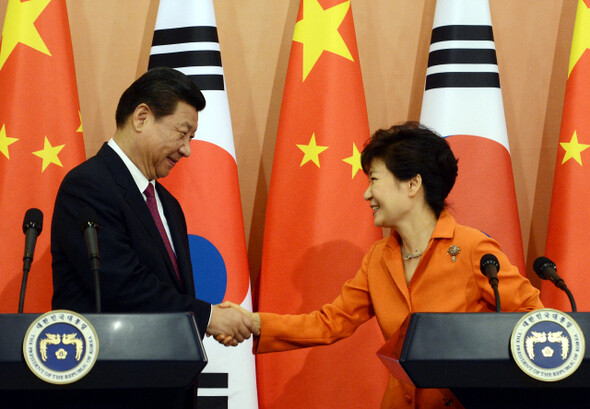hankyoreh
Links to other country sites 다른 나라 사이트 링크
Source: Xi Jinping voiced concerns about missile defense during summit

By Seong Yeon-cheol, Beijing correspondent
Chinese President Xi Jinping voiced concerns about the missile defense system to President Park Geun-hye during their summit last month, diplomatic source in Beijing have said.
“At the South Korea-China summit in Seoul on July 3 and 4, Xi apparently told the President that the missile defense system the US is pushing for ‘is not helpful to Chinese security interests’ and asked for South Korea’s ‘consideration,’” a diplomatic source in Beijing said on Aug. 26.
Another source said only that the two leaders “exchanged some generalities about the regional situation.”
“South Korea doesn’t actually have the THAAD (Terminal High Altitude Area Defense) system deployed on the ground, so China didn’t mention any specifics as far as I’m aware,” the source said. THAAD is an anti-ballistic missile system that is a key component of missile defense.
Neither side made mention of missile defense in their statements after the summit. But while Xi’s remarks consisted mainly of generalities, it could be a signal signal that Beijing does not want Seoul joining the US-led missile defense system.
China has already made numerous complaints about the system, which it sees as part of a US strategy to hem it in. Speaking with reporters about Xi’s visit on July 1, Chinese Foreign Minister Liu Zhenmin said, “The US and South Korea are allies, but I also think South Korea is going to be cautious in dealing with the US’s demands.”
“China doesn’t want tensions rising or an arms race happening in Northeast Asia,” Liu said at the time.
Chinese Foreign Ministry spokesperson Qin Gang also addressed the issue in remarks made in May.
“We’re not going to allow tensions to rise so that war or chaos erupts on China’s doorstep,” Qin said at the time.
“Introducing a missile defense system on the Korean Peninsula is not good for the strategic balance,” he added.
China’s chief concern is reportedly the fact that the THAAD system’s X-band radar has a detection range of 1,000 kilometers, which means a system deployed in South Korea would allow for detection of major cities like Beijing, Shanghai, and Dalian.
Please direct questions or comments to [english@hani.co.kr]

Editorial・opinion
![[Column] Has Korea, too, crossed the Rubicon on China? [Column] Has Korea, too, crossed the Rubicon on China?](https://flexible.img.hani.co.kr/flexible/normal/500/300/imgdb/original/2024/0419/9317135153409185.jpg) [Column] Has Korea, too, crossed the Rubicon on China?
[Column] Has Korea, too, crossed the Rubicon on China?![[Correspondent’s column] In Japan’s alliance with US, echoes of its past alliances with UK [Correspondent’s column] In Japan’s alliance with US, echoes of its past alliances with UK](https://flexible.img.hani.co.kr/flexible/normal/500/300/imgdb/original/2024/0419/2317135166563519.jpg) [Correspondent’s column] In Japan’s alliance with US, echoes of its past alliances with UK
[Correspondent’s column] In Japan’s alliance with US, echoes of its past alliances with UK- [Editorial] Does Yoon think the Korean public is wrong?
- [Editorial] As it bolsters its alliance with US, Japan must be accountable for past
- [Guest essay] Amending the Constitution is Yoon’s key to leaving office in public’s good graces
- [Editorial] 10 years on, lessons of Sewol tragedy must never be forgotten
- [Column] A death blow to Korea’s prosecutor politics
- [Correspondent’s column] The US and the end of Japanese pacifism
- [Guest essay] How Korea turned its trainee doctors into monsters
- [Guest essay] As someone who helped forge Seoul-Moscow ties, their status today troubles me
Most viewed articles
- 1[Column] The clock is ticking for Korea’s first lady
- 2After 2 months of delayed, denied medical care, Koreans worry worst may be yet to come
- 3Samsung barricades office as unionized workers strike for better conditions
- 4[Column] Has Korea, too, crossed the Rubicon on China?
- 5All eyes on Xiaomi after it pulls off EV that Apple couldn’t
- 6[Correspondent’s column] In Japan’s alliance with US, echoes of its past alliances with UK
- 7US overtakes China as Korea’s top export market, prompting trade sanction jitters
- 8Hong Se-hwa, voice for tolerance whose memoir of exile touched a chord, dies at 76
- 9[Photo] Smile ambassador, you’re on camera
- 10[Editorial] When the choice is kids or career, Korea will never overcome birth rate woes